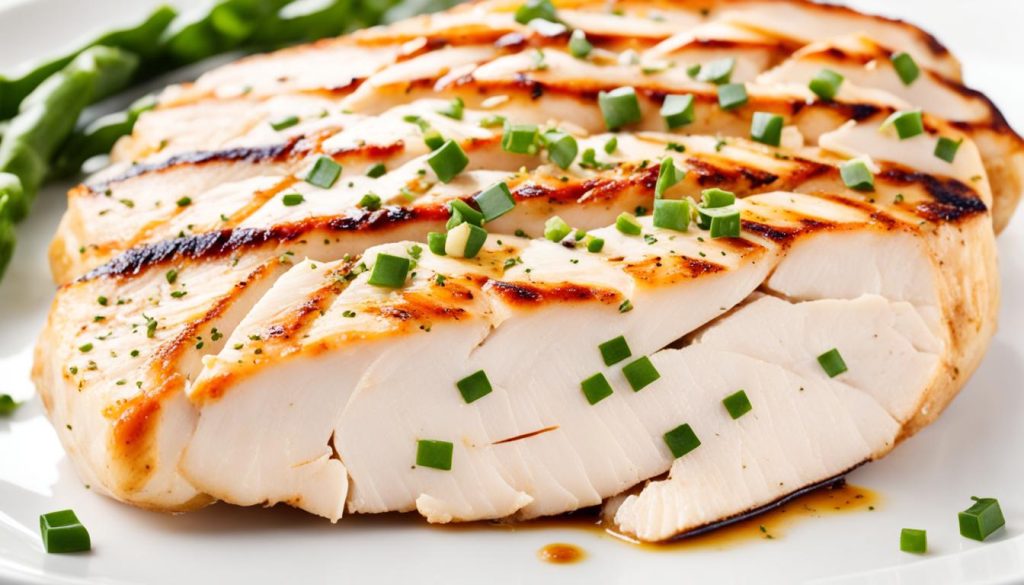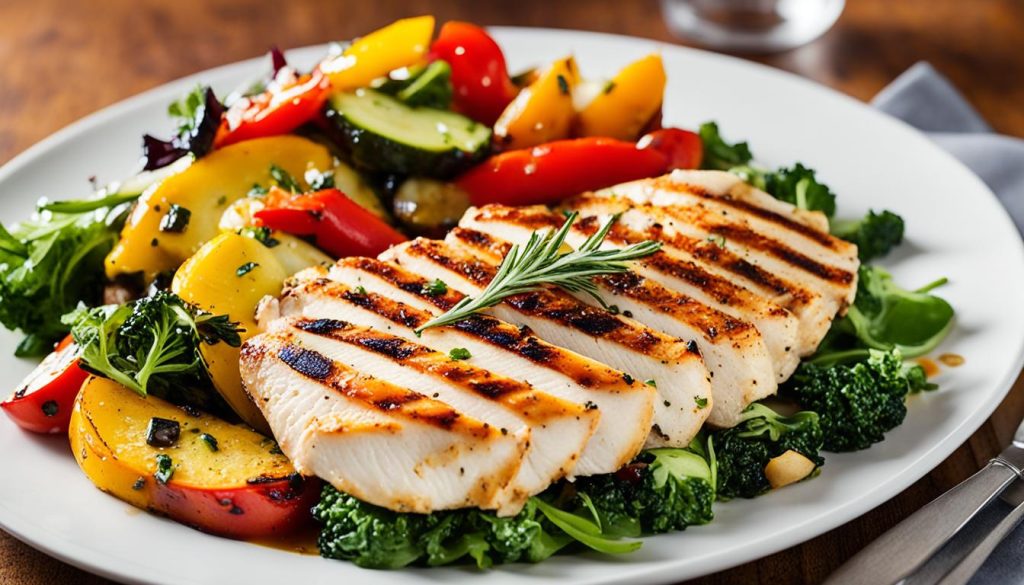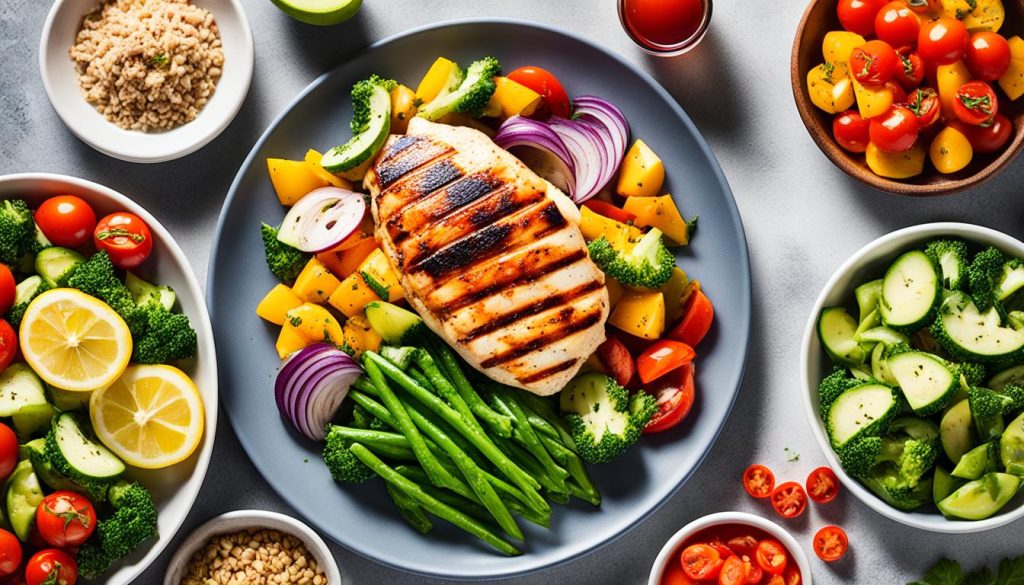Chicken breast is a highly popular cut of chicken known for its high protein content. It contains 32 grams of protein per 100 grams, making it an excellent choice for meeting protein requirements in a balanced diet. This lean meat is especially favoured by fitness enthusiasts and individuals aiming to build muscle or lose fat. It is also low in calories, with 56 grams of protein and 166 calories per 100 grams.
How Much Protein in a Chicken Breast?
In addition to chicken breast, there are other cuts of chicken that provide significant protein content. Chicken thighs, drumsticks, and wings are all popular options that contribute to a well-rounded diet.
Chicken thighs, known for their tender and juicy meat, contain approximately 25 grams of protein per 100 grams. They offer a slightly higher fat content compared to chicken breast, which lends to their rich flavour and succulence.
Drumsticks, with their satisfying meat-to-bone ratio, are another protein-packed choice. They provide approximately 24 grams of protein per 100 grams and are often enjoyed by those who appreciate the meaty texture and inherent deliciousness.
Chicken wings, comprised of drumettes, wingettes, and wing tips, are beloved as finger food and popular at social gatherings. They also boast 24 grams of protein per 100 grams, making them a tasty and protein-rich snack.
It’s important to note that while these cuts offer high protein content, they also contain slightly more fat than chicken breast. However, they make up for it in flavour and versatility. Whether you’re cooking up a tender chicken thigh curry, indulging in some barbecue chicken wings, or enjoying a crispy drumstick, these cuts provide a satisfying and protein-packed meal option.

Nutritional Benefits of Chicken Breast
Chicken breast is not just a delicious and versatile meat; it also offers numerous nutritional benefits that contribute to a healthy lifestyle. Let’s explore the reasons why chicken breast is considered a valuable addition to any diet.
Rich in Lean Protein
Chicken breast is a fantastic source of lean protein, which is essential for various body functions. Protein helps maintain muscle mass and promotes muscle recovery after exercise, making it particularly beneficial for individuals engaged in physical activities or muscle-building routines. Additionally, protein aids in weight loss by increasing satiety and boosting metabolism. Incorporating chicken breast into your meals can support your fitness goals and contribute to a well-rounded diet.
Low in Fat and Calories
If you’re watching your calorie intake or trying to shed a few pounds, chicken breast is an excellent choice. It is naturally low in fat, making it a lean and healthier option compared to other cuts of chicken. Additionally, its low-calorie content allows you to enjoy a satisfying meal without compromising your dietary goals. Incorporating chicken breast into your weight loss plan can help you create a calorie deficit and support your overall health and well-being.

Abundance of Essential Nutrients
Chicken breast is not only packed with protein but also contains important nutrients that contribute to your overall health. It is rich in selenium, an antioxidant that helps protect your cells from damage. Additionally, it provides phosphorus, a mineral that plays a vital role in bone health and energy production. Chicken breast is also a good source of vitamin B6 and niacin, which are crucial for proper brain function, heart health, and metabolism. By incorporating chicken breast into your diet, you can nourish your body with these essential nutrients.
Overall, chicken breast offers a wide range of nutritional benefits. Its rich protein content, combined with its low-fat and low-calorie attributes, makes it a prime choice for individuals aiming to build muscle, lose weight, or maintain a healthy lifestyle. The abundance of essential nutrients found in chicken breast further enhances its nutritional value. Whether you’re a fitness enthusiast or simply seeking balanced nutrition, chicken breast is a fantastic addition to your diet.
Choosing the Right Cut of Chicken for Your Goals
The choice of chicken cut depends on your health and fitness goals. If your goal is weight loss or calorie control, the best chicken cut for you is chicken breast. Chicken breast is known for its low-fat and high-protein content, making it an excellent choice for a low-calorie and high-protein diet. With approximately 32 grams of protein per 100 grams, chicken breast provides a lean source of protein that can help support weight loss and muscle maintenance.
On the other hand, if your aim is to build muscle mass or gain weight, fattier cuts like chicken thighs, drumsticks, or wings can provide more calories. These cuts are higher in fat content compared to chicken breast and can offer a good source of healthy fats and additional calories for muscle building and weight gain.
If you’re following a low-carb or keto diet, the higher fat content in chicken thighs, drumsticks, or wings can be beneficial. These cuts provide a source of fat along with protein, which is essential for those following a low-carb or ketogenic eating plan [1].
Ultimately, the best chicken cut for you depends on your specific dietary needs and goals. Whether you’re looking to lose weight, build muscle, or simply maintain a balanced diet, choosing the right cut of chicken can play a role in achieving your desired outcomes.

Whether you’re seeking the best chicken cut for weight loss, comparing chicken breast vs chicken thigh, or looking for chicken cuts suitable for muscle building, understanding the different options and their nutritional qualities can help you make an informed decision.
Remember, a healthy diet is about balance, and incorporating a variety of chicken cuts into your meals can provide a range of nutrients while satisfying your taste preferences and goals.
Chicken Breast Macros and Calories
In a 100-gram serving of chicken breast, you’ll find 32 grams of protein, 166 calories, and 0 grams of carbohydrates. Chicken breast is an excellent source of lean protein, making it a popular choice for those focused on protein intake and calorie control.
With its high protein content and minimal fat, chicken breast is a nutritious option for individuals looking to meet their protein needs while keeping their calorie count in check. Whether you’re following a specific diet or simply aiming for a balanced, health-conscious approach, chicken breast can support your goals.

- Chicken Breast Macros: Each 100-gram serving of chicken breast contains 32 grams of protein, 166 calories, and 0 grams of carbohydrates. These macros make it a valuable addition to a high-protein, low-carb diet.
- Chicken Breast Calorie Count: With only 166 calories per 100 grams, chicken breast provides a substantial amount of protein without significantly impacting your daily calorie intake.
- Chicken Breast Nutrition Information: In addition to its macros, chicken breast is a good source of essential vitamins and minerals, including B vitamins, selenium, and phosphorus, which are important for overall health and well-being.
Whether you’re aiming to build muscle, lose weight, or maintain a healthy lifestyle, chicken breast can play a crucial role in providing the necessary nutrients for success.
Conclusion
Chicken breast is a highly nutritious and protein-rich food choice, making it an excellent option for overall health. With its high protein content, chicken breast provides essential amino acids that support muscle growth and recovery. Whether you’re aiming to lose weight, build muscle, or maintain a balanced diet, chicken breast is a versatile meat that can be included in various recipes and dietary plans.
Not only is chicken breast a lean meat, but it is also low in calories, making it an ideal choice for those watching their calorie intake. It is a great source of high-quality protein, allowing you to meet your protein needs without consuming excess fat or carbohydrates. This makes chicken breast a preferred choice for individuals looking to include protein in their diet while maintaining a healthy body composition.
When selecting between different cuts of chicken, it’s essential to consider your personal goals and dietary preferences. Chicken breast is a high protein lean meat that provides numerous health benefits, but if you’re aiming to increase calorie intake or follow a low-carb diet, other cuts like chicken thighs or wings may be more suitable. Regardless of your choice, incorporating chicken breast into your meals can help you achieve your protein intake goals and support your overall health and well-being.
FAQs
How much protein is in a chicken breast?
Chicken breast contains approximately 32 grams of protein per 100 grams.
What is the nutritional value of chicken breast?
In addition to being high in protein, chicken breast is also low in calories, with 56 grams of protein and 166 calories per 100 grams.
How does the protein content of chicken breast compare to other cuts of chicken?
Chicken thighs contain 25 grams of protein per 100 grams, while drumsticks and wings contain 24 grams of protein per 100 grams.
What are the nutritional benefits of chicken breast?
Chicken breast is a rich source of lean protein, as well as selenium, phosphorus, vitamin B6, and niacin.
Which is the best cut of chicken for weight loss?
Chicken breast is the best option for weight loss or calorie control due to its low-fat and high-protein content.
Should I choose chicken breast or chicken thigh to build muscle?
Chicken thighs, drumsticks, or wings can provide more calories for individuals aiming to build muscle mass or gain weight.
How many calories are in chicken breast?
In a 100-gram serving of chicken breast, there are 166 calories.
Can I include chicken breast in my low-carb or keto diet?
Yes, chicken breast is low in carbs and can be included in low-carb or keto diets.
What is the portion size for chicken breast?
The portion size for chicken breast may vary depending on individual dietary needs and goals.
Is chicken breast a healthy choice?
Yes, chicken breast is a highly nutritious and protein-rich food choice with minimal fat and no carbs.

